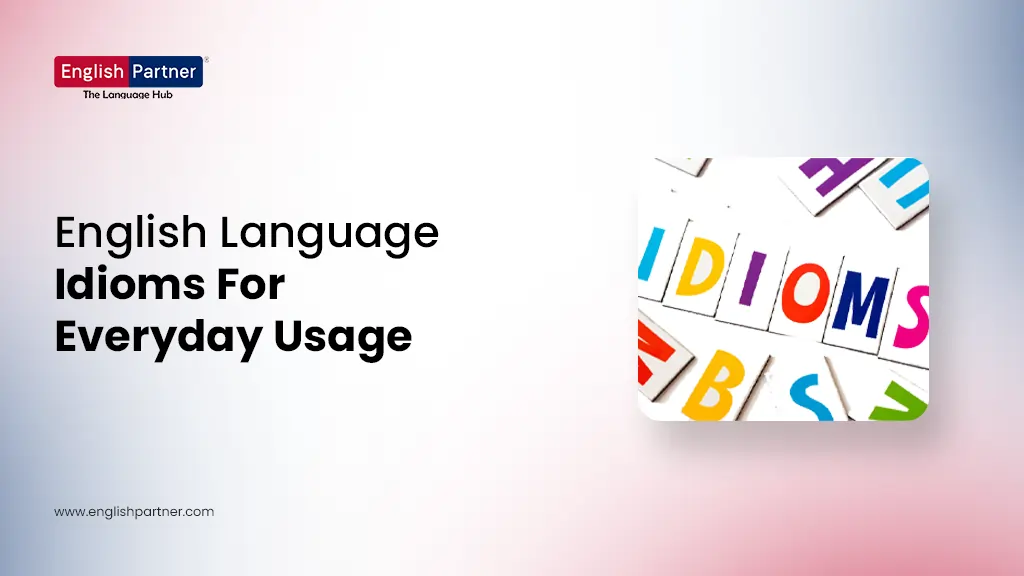
Content Creator

Have you ever considered What an idiom is ? And why do they confuse us so much? But we all take notice of someone when they use idioms in speech. Does the speaker have a realistic conversation? Is it not?
Yeah! The usage of idioms in conversation makes our head wrap around but a non-native speaker must go an extra mile to learn and understand Idioms. Because idioms don’t convey literal meaning. Thay are expressions with implied meaning.
So now here in this blog let us learn some idiomatic expressions for everyday usage.
An idiom is an expression that has a figurative meaning.
The idiom on my plate means she has a lot of work to do.
Here are Idioms you can on Everyday.
1.Idiom: Break a leg.
Meaning: Good luck!
Usage: I’m wishing you all the best for your interview, Break the leg!
2.Idiom: Bite the bullet
Meaning: To face a difficult situation bravely.
Sentence: It’s time to bite the bullet and face the problem bravely!
3.Let the cat out of the bag
Meaning: To reveal a secret.
Sentence: Please don’t let the cat out of the bag about our weekend plans.
4.Jump on the bandwagon
Meaning: To join a popular trend or activity.
Sentence: Everyone is trying this new diet, so I am planning to jump on the bandwagon.
5.Spill the beans
Meaning: To reveal a secret.
Sentence: I guess, Anu spilled the beans about the surprise party tonight.
Meaning : To be extremely happy.
Sentence: The couple is over the moon to hear they blessed with baby girl
2.Feel under the weather
Meaning : To feel unwell.
Sentence: Arun felt under the weather so he missed his class today.
3.Get on someone’s nerves
Meaning: To annoy someone.
Sentence: Please stop tapping your foot. It’s getting on my nerves
4.Lose your head
Meaning: To become very angry or upset.
Sentence: Don’t lose your head over such small mistake
5.See eye to eye:
Meaning: To agree.
Sentence: I’m glad we are able to see eye to eye on this issue.
1.At the end of your rope
Meaning: To be very tired or frustrated.
Sentence: I’m at the end of my rope on solving this problem.
2.In hot water
Meaning: In trouble.
Sentence: She is in hot water for breaking the rules.
3.Out of the woods
Meaning: No longer in danger.
Sentence: The patient is out of the woods, but she needs to be monitored closely.
4.Raining cats and dogs
Meaning: Pouring heavily.
Sentence: It’s raining cats and dogs! Better take Umbrella.
5.A piece of cake:
Meaning: Very easy.
Sentence: Learning Car is a piece of cake if you get the hang of it.
1.A bad apple
Meaning: A bad person in a group.
Sentence: There’s one bad apple in the group who causes all the trouble.
2.A couch potato
Meaning: A lazy person who spends a lot of time watching TV.
Sentence: Don’t be a couch potato! Go out and enjoy the sunshine.
3.An early bird
Meaning: A person who gets up early in the morning.
Sentence: she’s always an early bird. She is before the sun.
4.A night owl
Meaning: A person who stays up late at night.
Sentence: He’s a real night owl. He’s always up late at night.
5.A wet blanket
Meaning: A person who is no fun.
Sentence: Don’t be a wet blanket. Let’s have some fun.
Learning Idioms can be challenging but incorporating them in daily usage will sound more like a native. Idioms make your communication more effective and engage the listener.
Yashik is a dynamic content creator and persuasive copywriter who blends creativity with strategy. With a strong focus on audience engagement and digital impact, he crafts content that builds trust, drives traffic, and delivers results.

Idioms don’t mean what they literally say. Idioms often reflect the culture and history of a language.Idioms can convey subtle emotions or meanings.
Expose yourself to various forms of written English. Pay attention to how they use idioms in conversation.Try incorporating them into your own speech and writing.Refer to resources that explain the meanings and usage of idioms.
Make sure you understand the appropriate situation for using an idiom. Avoid using too many idioms in a single sentence or conversation. Ensure you know the correct meaning of an idiom before using it.
Yes, many idioms are culturally specific and may not be understood in other contexts.
Consult a dictionary or idiom guide as the resources provide definitions and usage examples.
Copyright © 2025 EnglishPartner . All rights reserved